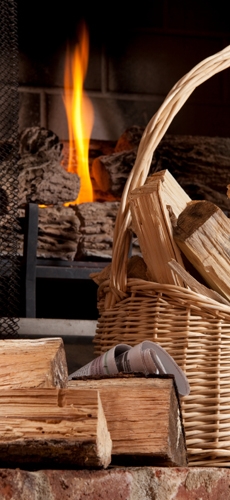There’s nothing that evokes a feeling of cosiness and comfort more on a cold November’s day, when your breath hangs suspended on the bracingly crisp air, than a roaring, raging, crackling fire. Fires are magic. They are breathtakingly beautiful to behold. They can cast a spell on those who gaze, mesmerised, into the dancing, flickering flames as they devour the ashen charcoal logs that lie crumbling in the hearth or lick at the smoky glass window of the cast iron stove door. Man has always been drawn to fire. It satisfies a primeval desire. It fends off wild animals, it is a source of energy that provides both comfort and warmth and it plays a key role in manufacturing processes and in preparing food. And you don’t have to be the proud owner of an Inglenook fireplace to feel and appreciate just how special a fire is.
It is important to know, however, that you won’t get a decent fire going and you won’t get to enjoy your glass of mulled wine while relaxing in front of your open range fireplace or unwinding in front of your stylish wood-burning stove if the wood you have chopped and stacked or bought from a local company is not as dry as you either think it is or is alleged to be!
Wet firewood can not only dampen your spirits, it can also dampen any endeavour you make to keep a good fire going. It doesn’t matter what type of wood it is – good old English oak, sweet-smelling spruce, or pine, beech or birch – if the moisture content of the wood is too high because the wood has not been given enough time to dry, then such moist, green, unseasoned wood will not only produce less heat, it will also produce more sparks and billowy, stinging smoke which can quickly cause a fire to fizzle out. In addition, the gases which your wet firewood sets free are harmful to the environment and therefore, of course, inevitably harmful to us all.
 So what can you do to make sure that you get the most out of your locally bought or harvested firewood? Here a list of do’s and don’ts:
So what can you do to make sure that you get the most out of your locally bought or harvested firewood? Here a list of do’s and don’ts:
- Store the wood for at least one year – two is even better – before you put it on the fire.
- Split the chunkier pieces of wood, like trunks and boughs, into smaller, handy-sized pieces. It not only looks better, it also speeds up the drying process considerably.
- Make sure that you store your wood in a dry, open place under a roof of sorts. Do not, under any circumstances, cover the wood with a plastic sheet or tarpaulin. It may stop raining from falling on it, but it also stops the moisture from evaporating.
- Do not wedge the pieces too closely together. Stack them loosely. The air has to be able to circulate, which also means leaving about 10cm room between your wood stack and the ground and walls. If you don’t, then the wood which you have so laboriously chopped and stacked will rot away and become useless as firewood.
- Make sure that your firewood really is dry. Dry means that the moisture content of the wood should not be higher than 20%. This is where the BM15 from Trotec can help out. The BM15 is a moisture meter which can measure the moisture content of your wood and provide you with a reliable and accurate reading in the space of only a few seconds.
And yes, it is worth it.
Because when you make a fire with dry wood you are not only heating more efficiently, you are also heating more safely too.
Dry wood burns longer and more evenly, and it also produces much less smoke and harmful gases – smoke and gases that cannot only quickly work their way back into the room when you open the door to remedy the situation, but which also pollute the atmosphere and cause considerable discomfort to your neighbours. And to make matters even worse, wet wood leaves high creosote deposits, i.e. unburnt fuel (!) in your chimney. This is like an accident waiting to happen, because the creosote can ignite and cause a chimney fire, which could also quickly spread through your entire house!
Far be it from us to put you off using firewood to feed your fireplace or stove. But we do feel that it is important to know that there are some very real safety issues involved when it comes to burning wood and we also think that you will want to get the most out of your firewood, not only from a financial point of view.
After all, was it not Thoreau who once wrote “Every man looks at his woodpile with a kind of affection.”
Trotec. We’re here to make a difference.

